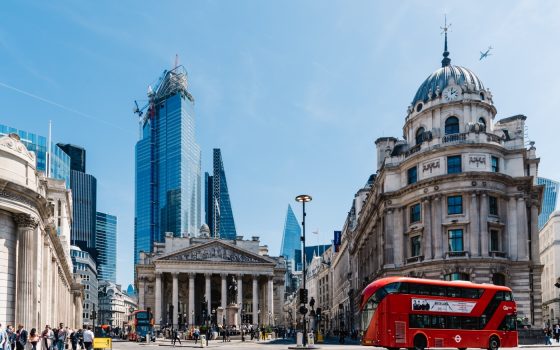Recessions: explained
The recession of a decade ago looms very large in our collective memory. But what actually causes a recession?
08 November 2019
Last quarter, quarterly output (goods and services produced in the economy as measured by GDP) fell for the first time in six and a half years, leading economic analysts to start spouting gloomy predictions. By technical definition an economy is in recession if output falls for two consecutive quarters, and it is looking increasingly likely that the UK is at risk of a recession at some point in the relatively near future. If the next quarterly figures show a further drop in output, we will officially be in recession.
The recession of a decade ago looms very large in our collective memory. And we are still living with the impacts: living standards have not fully recovered and wages are still lower on average than they would have been without the recession. But what actually causes a recession, and what can we say about the impacts of another one?
The story of the last recession — triggered by the US subprime mortgage market collapsing and subsequent financial crisis – is well known. But recessions are not all the same, differing from each other in their causes (from banking crises to oil price fluctuations) and their impacts. The commonality is that recessions are usually triggered by ‘shocks’ to the economy – which is what economists call random, unpredicted events. By definition, this is something the markets did not predict. So we cannot predict exactly when a recession might occur, but we can monitor the risks of a recession and study economic indicators such as business and consumer confidence data, employment and hours worked data, and interest rates to let us know when one might be about to occur.
“Living standards have not fully recovered and wages are still lower on average than they would have been without the recession.”
These shocks to the economy cause a recession if they lead to a reduction in output. So, why does output fall? There are a range of reasons, but ultimately output falls due to a fall in spending and/or a fall in investment. Economists say that recessions happen due to a lack of aggregate demand for goods or services or investment in future production. This can be influenced by all sorts of things: in the last recession the financial crash led to a decline in bank lending – therefore lower firm investment and consumption by families. High interest rates, or sharp increases to interest rates can also reduce borrowing and investment.
But a particular concern with the next recession is consumer and business confidence. Consumers may be concerned about the state of the economy – or the state of the future economy, given the uncertainty over Brexit. Consumers may delay spending, or save for a time when they will need the cash. This is exacerbated as the amount firms produce depend on consumer demand in the economy, and what they choose to invest determines future production plans i.e. firm production depends on what level of goods and services do consumers want to purchase now, and how much will they want to purchase in the future. Reduced consumer confidence may reduce business confidence.
So when facing a lack of demand, firms have two options. They can respond by producing less stuff. And the less stuff that needs to be produced, the less people they need to employ. Or they may respond by reducing the costs of production, either by cutting wages directly (or at least holding them down), or by cutting working hours. It may also be a combination of both, with firms laying off some workers and holding down wages of the rest.
The fall in output that we are seeing at the moment is likely due to artificially inflated figures in the previous quarters: the economy performed better than expected during 2018 and the first three months of 2019 due to firms stockpiling as a result of Brexit. Worried firms purchasing goods have driven up economic activity. But this appears to be declining and will not be sustained. As uncertainty over Brexit continues, consumers may save more for upcoming economic hardship, ironically decreasing demand and increasing the likelihood of a recession as described above.
“As uncertainty over Brexit continues, consumers may save more for upcoming economic hardship, ironically decreasing demand and increasing the likelihood of a recession”
The most recent recession in the UK (in 2008) was characterised by relatively low unemployment compared to what could have been expected given its severity – this was likely due to the fact that it was swiftly followed by a fall in the value of the pound. This caused inflation – price rises. But firms did not pass the price increases from selling their goods and services back to the workers. So wages stagnated while prices rose. Because this reduced costs for firms, it limited the number of workers that were laid off. But in an upcoming recession, there is no guarantee that prices will rise in the same way – unemployment may be much higher.
Government policy can mitigate or worsen the impacts of a recession. When people aren’t spending as much, the government can step in and drive demand through its own spending: investing in infrastructure projects for example. In addition, welfare policies can provide a safety net for those who lose jobs or who are on low incomes – giving people more cash to spend on essentials means keeping the economy moving. It is vital for a well-functioning economy that everyone has money, particularly poorer people who are more likely to spend their cash than sit on it.
Unfortunately, austerity policies following the last recession had the opposite effect, curbing government spending and putting a cap on welfare for the poorest. How the government responds to the next recession will be crucial in determining its impacts. And there are two clear priorities for the government when it happens. Firstly, investing significantly in the green energy infrastructure we need. And secondly, improving welfare to boost the money in people’s pockets – for example our Weekly National Allowance policy, which redistributes gains from the tax free personal allowance more equitably, to provide weekly cash payment for everyone.
This is an extract from the New Economics Zine. Read the full issue here
Image: Randi Hausken (CC BY-NC-ND 2.0)
Topics Banking & finance Macroeconomics






